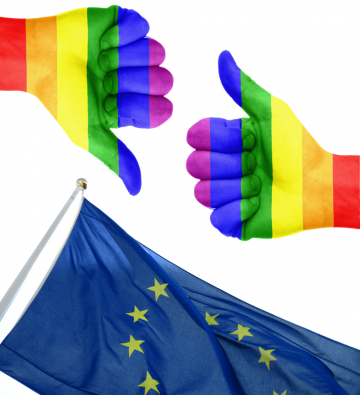Update on legal protection for LGBTI people

“FRA’s legal analysis of the fundamental rights situation of LGBTI people shows there has been progress in some areas,” says FRA Director a.i. Constantinos Manolopoulos. “However, it also reveals persistent barriers that need to be lifted to allow all LGBTI people fully enjoy their rights.”
The report ‘Protection against discrimination on grounds of sexual orientation, gender identity and sex characteristics in the European Union: Comparative legal analysis’ reveals key developments and trends in the legal protection of fundamental rights of LGBTI people across the EU. Examples include:
- Limited protection from sexual orientation and gender identity discrimination: The adoption of the EU’s proposed Equal Treatment Directive would help broaden and better protect LGBTI people in important areas of their life.
- Stronger protection from hate crime: To help tackle hate crime, Member States need to address underreporting and the lack of hate crime statistics.
- Unclear definitions of ‘family members’ impede freedom of movement within the EU for LGBTI families: Member States should consider acknowledging the civil status granted in another Member State to facilitate the right to freedom of movement for all EU citizens.
- Poor understanding of the rights of intersex people: Member States need to review their laws and practices that can result in discrimination, and violations to the physical and psychological integrity of intersex people, especially children.
Overall, the report acknowledges the encouraging legislative developments that have occurred since 2010. However, it also points to the challenges that remain. Added to the fear, isolation and discrimination LGBTI people face in their daily lives revealed in FRA’s EU LGBT survey, it underlines how many LGBTI people would benefit from greater efforts by the EU and its Member States to address the European Commission’s list of actions to advance LGBTI equality.
For further information: media@fra.europa.eu / Tel.: +43 1 580 30 642
Notes to editors:
- The report examines access to and legal recognition of the preferred gender, non-discrimination and the promotion of equality in employment, LGBTI people and public spaces (freedom of expression, assembly and protection from abuse and violence), the fundamental rights situation of intersex people, family members in free movement, family reunification and asylum, and international protection and asylum for LGBTI people.
- For more on FRA’s LGBTI work, and its forthcoming report from its survey on public authorities, see the FRA website.
- On 7 December, Věra Jourová, the EU Commissioner for Justice, Consumers and Gender Equality presented the European Commission’s list of actions to advance LGBTI equality to the EU Council’s Employment, Social Policy, Health and Consumer Affairs Council. It pointed to the need to enforce the transposition of existing EU law relevant to LGBTI people as well as addressing other gaps in legal protection.
- The European Union Agency for Fundamental Rights (FRA) provides evidence-based advice to EU and national decision makers, thereby contributing to more informed and better targeted debates and policies on fundamental rights.